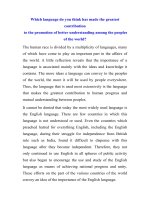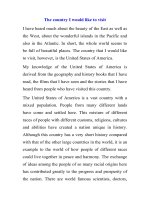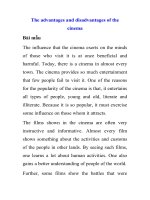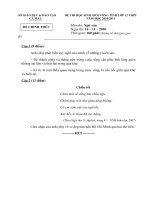LUẬN MẪU LỚP 12 Which language do you think has made the greatest contribution
Bạn đang xem bản rút gọn của tài liệu. Xem và tải ngay bản đầy đủ của tài liệu tại đây (80.29 KB, 12 trang )
Which language do you think has made the greatest
contribution
to the promotion of better understanding among the peoples
of the world?
The human race is divided by a multiplicity of languages, many
of which have come to play an important part in the affairs of
the world. A little reflection reveals that the importance of a
language is associated mainly with the ideas and knowledge it
contains. The more ideas a language can convey to the peoples
of the world, the more it will be used by people everywhere.
Thus, the language that is used most extensively is the language
that makes the greatest contribution to human progress and
mutual understanding between peoples.
It cannot be denied that today the most widely used language is
the English language. There are few countries in which this
language is not understood or used. Even the countries which
preached hatred for everything English, including the English
language, during their struggle for independence from British
rule such as India, found it difficult to dispense with this
language after they became independent. Therefore, they not
only continued to use English in all spheres of public activity
but also began to encourage the use and study of the English
language as means of achieving national progress and unity.
These efforts on the part of the various countries of the world
convey an idea of the importance of the English language.
It would be instructive, however to consider the reason for the
extensive use of the English language. One of the reasons is that
several countries in the world have been occupied mainly by
immigrants from England such as the United States of America,
Australia and New Zealand. It is therefore not surprising that the
people of such countries have continued to use the English
language, though they have severed their political connexions
with their mother country and acquired independent status, for
one cannot discard one’s language easily. Another reason is that,
in the course or history, a large number of countries throughout
the world came directly under British rule, where English was
made the main language for administrative, commercial and all
other purposes.
As the leading colonial power in the world, England has indeed
exerted a profound influence on the affairs of the world, though
her colonial possessions are rapidly becoming independent one
after the other. Concomitantly, the English language too has
come to play a leading role in international communication.
Thus, many people whose native language is not English have
studied English and become more conversation with English
than with their own languages. This is especially true with the
leaders of the people to whom English is a foreign language. As
a result, the English language is used by them not only in the
administration of their countries but also in all their institutions
of higher learning.
The most important reason for the pre-eminence of the English
language, however, is that it is the source of all knowledge. The
Industrial Revolution that began in England and spread to other
countries revealed the English genius for invention. Even the
political and social institutions of England, which were affected
tremendously by the Industrial Revolution, have evoked the
admiration of all countries. The knowledge, ideas, experiences
and profound thoughts of the English people have made a deep
impression on the minds of the people of other countries.
Innumerable books have been written in the English language
on all branches of study, and such is the thirst of English
scholars for knowledge and their desire to communicate it, that
they have even translated books of great value from other
language to English for the benefit of all. Writers of other
nationalities too have written a great number of books in English
and made a substantial contribution to the enrichment of the
English language. As a result of all these efforts, the English
language has become the main avenue to the greatest storehouse
or information. Therefore, people everywhere have developed a
special respect for the language and they continue to learn it
with avidity.
As the English language is used so extensively it is mainly in
this language that the peoples of the world communicate with
and understand one another. No other language has such a wide
appeal or popularity. I am therefore of the opinion that it is the
English language that has made the greatest contribution to the
promotion of the better understanding among the peoples of the
world.
New words:
1. multiplicity (n): vô số
2. mutual (adj): qua lại, lẫn nhau
3. preach (v): chủ trương, thuyết giáo
4. immigrant (n) : người nhập cư
5. connexion (n) : mối quan hệ
6. discard (v) : vứt bỏ, thải hồi
7. administrative (adj) : (thuộc) hành chính
8. commercial (adj) : (thuộc) thương mại
9. concomitantly (adv) : đi đôi với, đồng thời
10. pre-eminence (n) : sưu việt hơn hẳn
11. evoke (v): gợi lên
12. innumerable (adj) : vô số
13. substantial (adj) : lớn lao, đáng kể, quan trọng
14. avidity (n) : sự khát khao
15. appeal (n) : sự hấp dẫn
Liberty
Since his appearance on the earth, man has instinctively longed
for liberty, an ideal which has inspired revolts and revolutions
throughout the long history of the human race.
The yearning for liberty or freedom is not restricted to man
alone. Even animals, birds and all living creatures love the
freedom that God has given to them. Like men, these creatures
will never submit to captivity without resistance. Neither will
they cease to make tenacious efforts to escape, once they are
captured.
In the early days of their existence, men were free to pursue
their own affairs, within the limits of their own ability. They
moved from place to place in small isolated groups and families,
in search of food, which consisted of edible plants. fruits and the
flesh of animals. The pursuit of the means of survival was their
only occupation, and the things that restricted their freedom of
movement, to some extent, were their own fears of the unknown
and natural barriers such as mountains, dense forests, and rivers.
These were no restraints imposed upon them by human
institution and they enjoyed their liberty.
Gradually, men learned to live in communities and various
institutions were established, which soon curtailed their liberty
to a great extent. Rules were made for the cohesions of each
community and obedience to those rules was secured by the
threat of punishment. This element of compulsion imposed upon
the conduct of the individuals in the community restricted the
liberty of the people; but the greater security that men enjoyed
in community life provided the incentive to partial sacrifices.
Soon, however, conflicts developed among the various
communities. The stronger one conquered the weaker one and in
the contest for power and domination, hundreds of people lost
their liberty completely. The enslavement and suppression of
one group of people by another provided the stimulus for
numerous revolts and revolutions for liberty which have not
ceased till this day.
Even in the same community. Sometimes, there were divisions.
The rulers, who came to be known as kings, with the
development of the communities into countries, were at variance
with their subjects. To maintain their status and to assert their
authority, kings developed their own theories of kingship, and
many of them ruled in the most despotic manner. Defiance of
the king's authority was punished by death and imprisonment.
What constituted defiance was decided arbitrarily by the king or
his ministers, and thousands or people were deprived of their
liberty.
Eventually, however, despotism aroused the fury of political
thinkers and writers in many countries. A crusade then began
against oppression and despotism, and the cry for liberty was
heard everywhere. Revolutions erupted; despotic rulers were
overthrown, and new rulers were compelled to rule with the
consent of the people. The French Revolution of the eighteenth
century is the best example of the extremity to which people
were prepared to go to retain or regain their liberty, which is
claimed to be the birth-right of every man.
But liberty does not mean licence. In other words, men's liberty
of action should not be excessive. The French Revolution is,
unfortunately, also the best example of how men may lose their
sense of proportion and justice, in their attempts to assert their
liberty. In that revolution hundreds of innocent men, women,
and children lost their lives at the hands of those who took full
advantage of the anarchy that then prevailed in France, to assert
their liberty of action. Such actions are indeed licentious .
Thus, it may be argued that liberty will remain the battle-cry of
all the people, but those who have it should not use it to hurt or
offend others or to deprive others of their liberty.
New words:
1. liberty (n): sự tự do, quyền tự do
2. revolt (n): cuộc nổi dậy, cuộc khởi nghĩa, cuộc nổi loạn
3. submit (v): chịu phục tùng, quy phục, ngừng phản kháng
4. tenacious (adj): kiên trì, ngoan cường, ngoan cố
5. isolated (adj): biệt lập, cô đơn
6. restraint (n): sự kiềm chế, sự gò bó, sự ràng buộc
7. curtail (v): tước đi, lấy đi
8. cohesion (n): sự dính liền, sự cố kết
9. compulsion (n): sự ép buộc, sự cưỡng bức
10. conquer (v): chinh phục, chế ngự
11. enslavement (n): sự nô dịch hoá, tình trạng bị nô dịch
12. suppression (n): sự đàn áp hoặc bị đàn áp
13. stimulus (n): sự kích thích, tác nhân kích thích
14. status (n): đia vị, thân phận, thân thế
15. despotic (adj): chuyên chế, chuyên quyền, bạo ngược
16. defiance (n): sự công khai kháng cự hoặc không tuân theo
17. constitute (v): cấu thành, tạo thành
18. arbitrarily (adv): chuyên quyền, độc đoán
19. arouse (v): đánh thức, khuâý động, gợi
20. crusade (n): chiến dịch; cuộc vận động lớn
21. claim (v): khẳng định, quá quyết
22. excessive (adj): quá thể, quá đáng
23. anarchy (n): tình trạng vô chính phú, tình trạng hỗn loạn
24. prevail (v): thắng thế, chiếm ưu thế, phổ biến khắp nơi
25. licentious (adj): bừa bãi, phóng túng
26. oppress (v): áp bức, đàn áp
Discuss the role of the police force in society
The police force plays a vital role in the maintenance of law and
order in society. It is a source of moral strength, confidence and
happiness to all individuals who seek to live a good life in
society.
The ideal of a police force has been conceived centuries ago,
when lawyers acts were committed everywhere; but it was only
in the nineteenth century that effectual steps were taken to build
up a strong police force in almost every country. Life, before the
introduction of the police force, was indeed insecure. Violent
acts such as murder were committed with impunity by cruel and
reckless men. Even those who were weak and feared revenge by
stronger men nevertheless found it safe sometimes to commit
lesser crimes such as theft and robbery. Without the restraining
influence of a powerful organization such as the police force, the
passions of men were aroused easily, and lawlessness prevailed
everywhere. Individuals grouped themselves together and
terrorized whole villages and towns, and there were wars
between rival groups. This state of affairs caused great sorrow
and acute anxiety to whole communities and everyone lived in
constant fear, uncertain even about his immediate future.
The establishment of the police force, however, has changed the
state of affairs in society. The police force has enabled the law
courts, which have existed since ancient times, in certain
countries even before the introduction of the police force, to
function more efficiently. Criminals are apprehended and
punished, with the help of the police force, to deter others from
committing acts injurious to innocent citizens. Most people
therefore have learned to control their criminal tendencies. The
alertness of the police force in the detection of crimes has not
only discouraged most people from breaking the laws of society
but also compelled them to exercise restrain and self-discipline.
Consequently, society as a whole is more peaceful than what it
was before the establishment of the police force.
As the aim of the police force is to promote the welfare of
society, it is constantly engaged in creating the conditions in
which people can live and pursue their own affairs without
interference from thoughtless individuals. The rights of every
member in society are protected by the courts through the
agency of the police force, which is therefore a source of
inspiration and hope to all law-abiding citizens. Any
interference with the rights of one citizen by another is frowned
upon by the police force.
In their efforts to promote the welfare of society the police force
extends its activities even to the remotest regions of the country.
If a man is lost in a dense forest or at sea by his own fault or
otherwise, members of the force do their utmost to find and
bring him back to his family, however unpleasant the effort may
prove. Seldom do they give up their search if they are certain
that the man still survives. Dedicated to the service of society,
they are prepared to work under any conditions to protect a
person, sometimes even at the risk of losing their own lives.
The knowledge of the activities in which the police force is
engaged has increased the confidence and moral strength of
people in society. Even the cripple and invalid are given every
protection. Thus, people today can live in greater security and
happiness than they could before. Society therefore owes a great
debt of gratitude to the police force.
New words:
1. vital (adj): sống còn, quan trọng
2. seek (v): mưu cầu, theo đuổi
3. conceive (v): hình thành 1 ý nghĩ, trong đầu có ý tưởng
4. commit (v): phạm lỗi
5. impunity (n): sự không bị trừng phạt
5 . rival (adj ): đối địch, cạnh tranh
7. ancient (adj) : xưa, cổ
8. apprehend (v) : bắt, tóm, nắm, lấy
9. deter (v) : ngăn cản, ngăn chặn, làm nản lòng
10. alertness (n): sự tỉnh táo, sự cảnh giác
11. discourage (v) : làm nản lòng, làm chán nản
12. compel (v) : bắt buộc, thúc ép
13. consequently (adv) : do đó, vì vậy, bởi vậy, cho nên
14. interference (n) : sự can thiệp, sự xen vào
15. law-abiding : trung thành với pháp luật, tuân theo luật pháp
16. frown (v) : không bằng lòng, phản đối
17. prove (v): tỏ ra, chứng tỏ, chứng minh
18. dedicated (adj): tận tụy, tận tâm
19. gratitude (n): lòng biết ơn, sự nhớ ơn









